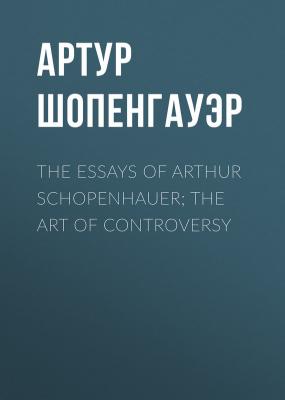ТОП просматриваемых книг сайта:
The Essays of Arthur Schopenhauer; the Art of Controversy. Артур Шопенгауэр
Читать онлайн.Название The Essays of Arthur Schopenhauer; the Art of Controversy
Год выпуска 0
isbn
Автор произведения Артур Шопенгауэр
Жанр Философия
Издательство Public Domain
4
Machiavelli recommends his Prince to make use of every moment that his neighbour is weak, in order to attack him; as otherwise his neighbour may do the same. If honour and fidelity prevailed in the world, it would be a different matter; but as these are qualities not to be expected, a man must not practise them himself, because he will meet with a bad return. It is just the same in a dispute: if I allow that my opponent is right as soon as he seems to be so, it is scarcely probable that he will do the same when the position is reversed; and as he acts wrongly, I am compelled to act wrongly too. It is easy to say that we must yield to truth, without any prepossession in favour of our own statements; but we cannot assume that our opponent will do it, and therefore we cannot do it either. Nay, if I were to abandon the position on which I had previously bestowed much thought, as soon as it appeared that he was right, it might easily happen that I might be misled by a momentary impression, and give up the truth in order to accept an error.
5
6
7
On the other hand, in his book
Eristic so far differs from Sophistic that, while the master of Eristic aims at mere victory, the Sophist looks to the reputation, and with it, the monetary rewards which he will gain. But whether a proposition is true in respect of its contents is far too uncertain a matter to form the foundation of the distinction in question; and it is a matter on which the disputant least of all can arrive at certainty; nor is it disclosed in any very sure form even by the result of the disputation. Therefore, when Aristotle speaks of
I am of opinion, therefore, that a sharper distinction should be drawn between Dialectic and Logic than Aristotle has given us; that to Logic we should assign objective truth as far as it is merely formal, and that Dialectic should be confined to the art of gaining one's point, and contrarily, that Sophistic and Eristic should not be distinguished from Dialectic in Aristotle's fashion, since the difference which he draws rests on objective and material truth; and in regard to what this is, we cannot attain any clear certainty before discussion; but we are compelled, with Pilate, to ask,
8
Diogenes Laertes tells us that among the numerous writings on Rhetoric by Theophrastus, all of which have been lost, there was one entitled [Greek: Agonistikon taes peri tous eristikous gogous theorias.] That would have been just what we want.
9
If it is in direct contradiction with a perfectly undoubted, truth, we have reduced our opponent's position
10
Socrates, in
11
Aristotle,
12
13
They are all a free version of chap. 15 of Aristotle's
14
The truth from which I draw my proof may he either (1) of an objective and universally valid character; in that case my proof is veracious,

